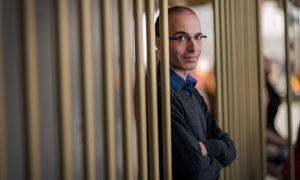Helen Lewis in The Guardian:
 Yuval Noah Harari’s career is a publishing fairytale. An obscure Israeli academic writes a Hebrew-language history of humanity. Translated into English in 2014, the book sells more than a million copies. Facebook’s Mark Zuckerberg includes it in his book club in 2015. Ridley Scott wants to turn it into a TV series. Barack Obama says it gave him perspective on “the core things that have allowed us to build this extraordinary civilization that we take for granted”. Its sales spike when it is mentioned on Love Island.
Yuval Noah Harari’s career is a publishing fairytale. An obscure Israeli academic writes a Hebrew-language history of humanity. Translated into English in 2014, the book sells more than a million copies. Facebook’s Mark Zuckerberg includes it in his book club in 2015. Ridley Scott wants to turn it into a TV series. Barack Obama says it gave him perspective on “the core things that have allowed us to build this extraordinary civilization that we take for granted”. Its sales spike when it is mentioned on Love Island.
That book was Sapiens, which is bold, breezy and engaging; romping its way from the discovery of fire to the creation of cyborgs in less than 500 pages. The future-gazing follow-up, Homo Deus, was also a global bestseller, and now Harari has turned his attention to the present with 21 Lessons for the 21st Century. It covers everything from war – Harari’s academic specialism – to meditation, his favourite leisure activity. (He does two hours a day, and a month-long retreat every year.) The collection of pieces aims to take stock of where humanity has reached, and where it might be going. Ultra-topical concerns such as “fake news” and the rise of authoritarians such as Donald Trump are set in the context of centuries of our biological and social evolution. As Obama said, this approach certainly gives the reader perspective. Ivan the Terrible was probably more, well, terrible than Trump. Cheer up! Until you remember climate change, at least – because, to his credit, Harari is one of the few futurists to factor ecological collapse into his predictions.
More here.
